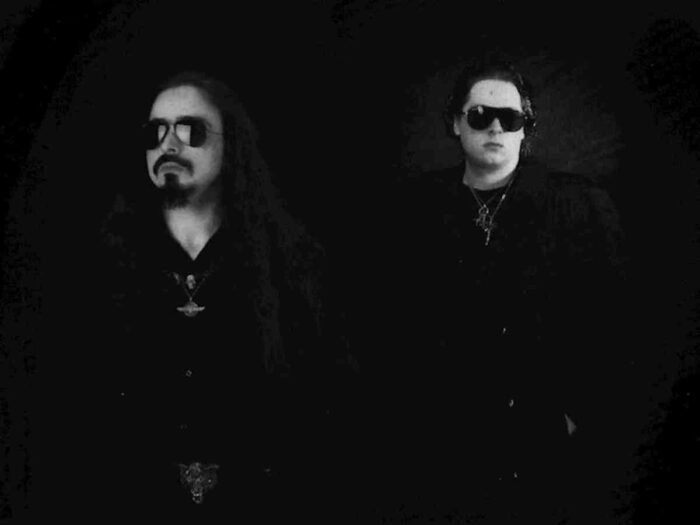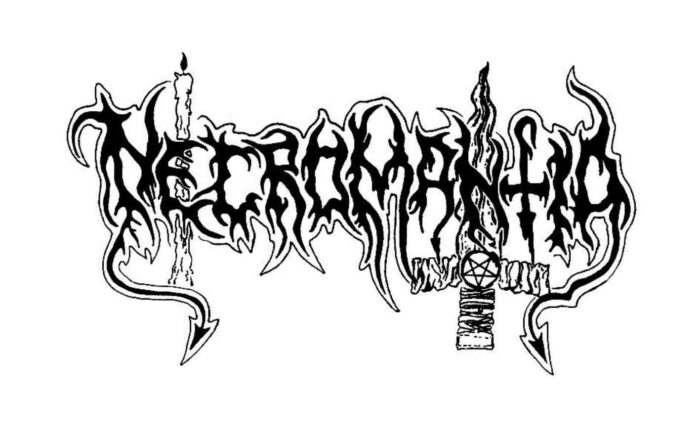Founding member of Greek cult black metal band Necromantia The Magus, formerly known as Magus Wampyr Daoloth, who recently cowrote a book that might be the most interesting assessment of metal in recent years, took the time to answer some of our questions and provide fresh mysteries for those who want to understand this cryptic and mythological subgenre.
In the book, you were quoted talking about the difference between the Greek blast beat and the regular form, but can you tell us more about the difference in approach of Greek death/black metal to other variants? It seems to have introduced more of a moody, crepuscular component.
The Greek scene always had its own distinct sound. Back in the days everyone involved was trying to create its music identity. Of course influenced by the giants of the past but in the early 90s the thirst to create and not just copy was strong. In Greece we had (still do) a tendency toward the more atmospheric stuff. More melodic complex stuff compared to the early Scandinavian BM scene. Personally speaking I want my music to be able to touch you emotionally and create images and stories in your mind. The “Greek Blast Beat” is a bit slower than the other and uses the snare in one, not the bass drum.
You speak about going to the wilderness in Corinth and how much this was an inspiration. Do you find nature-appreciation to be part of the black metal mental state, and how does this influence the music?
Sometimes yes. Isolated or deserted landscapes were always an inspiration because they are such a strong image. I also love the raging sea at night. It is like a restless soul.
Currently you are at work on a new album. What can you tell about it, especially how it will sound relative to Yoth Iria, Rotting Christ, and Necromantia?
All of the above and nothing like it. It definitely is the most complex and organic album I have ever done! It is in the same time rough and melodic, complex and emotional. All my influences through a horror Satanic kaleidoscope. You have been warned…
Apparently both you and Baron Blood were occasional pipe smokers. What are some of your favorite tobaccos and pipes? Did you find this different from cigarette smoking, and how does nicotine help with your creative process?
Damned nicotine. The devil’s drug. I like some Savinelli and Peterson pipes but my best one is made from amber. Really slow, pleasurable smoking. I like tobacco scented with cognac a lot…mostly everything without Latakia. I think nicotine has escorted me in most of my music creative journeys.
You mentioned the lyric “Our gods became your Satan and Satan became our god,” which seems to explain how black metal united the ancient pagan, hermetic, and cultural beliefs under one flag (Satanism, at least in imagery). Although these ancient beliefs were more associated with “earthly pleasures,” as you say, do you think there is more to it than that, like that these ancient religions were less moralistic and saw Earth and the Heavens as more continuous, as we see in the writings of Tolkien?
In a way yes. They were more practical and simple because they were born and made for the folk, the people. Mostly higher levels of initiation and the deeper search for wisdom and evolution came much later and were reserved only for the few…though ancient Greek and ancient Egyptian mysteries contained a higher level of knowledge and communion with the divine or the daemonic than the simple animistic practices, which were preserved through the ages…
“The Serpent and the Pentagram” mentions the influence horror movies had on you while growing up. More than a genre of movies, these might be seen as a genre of story, meaning that they seem to be based on similar narratives. What about this appeals to you, and what of it lives on in metal, in your view?
Horror movies are the medium which gives image and form to nightmares. It is like wandering and traveling in the Abyss but virtually, safer. So yes they can be a source of inspiration…but there are a lot of crappy stuff of them out there too
As a martial artist active in historical European martial arts, you seem to have discovered a form of “living” culture. What can black metal fans learn from the importance of culture, and how to keep it alive outside of popular music?
Historical Fencing connected me with my past. It is not only a sporty activity but also a study in history. It is important to know from where you came from. Strong roots give you strong wings to fly in the future and define who you are.
Do you think black metal aspires to heroic tales more than moralistic ones?
For me black metal is not blast beats, corpse paint and singing about personal issues. Black metal is a music which is defined mostly through the lyrics and symbolism. It is not defined by how you can scream but what you sing about. Being the Left Hand Path in all its forms and manifestations. The wonders of the Abyss, the beauties and nightmares of the dark side. This is black metal. Not blasting beats and screaming about your personal or social issues.
What is your favorite Necromantia release, and which one would you recommend for newcomers to your work?
Difficult but I will go with Scarlet Evil, Witching Black and To The Depths We Descend….
How can people keep track of what you are doing and your newest works?
They can follow us through our social media, bandcamp and website here:
THE MAGUS Web Facebook Instagram
NECROMANTIA Facebook Instagram BandCamp
Tags: Black Metal, interview, necromantia, the magus




Thanks for the interview – a deeply underappreciated artist.
Surprisingly short but welcome.
I am looking forward to the new album. Is it a solo thing or what? Clearly it’s not Yoth Iria.
And yes, Black Metal is about darkness and without that as its main focus, it’s something else (usually some melange of self pitying “post-rock” emo crap, speed metal and audial AIDS these days).
In my view, black metal is about accepting the need for evil instead of trying to legislate it away like the Christians do. The ancient gods were amoral because that is honest about how nature works, but after Judeo-Christianity, we tried to neuter everyone by prohibiting amoral methods of achieving moral goals. This prevented us from, for example, having sensible eugenics programs that exiled, asylumized, or executed the retarded, insane, criminal, or perverse. Black metal means accepting winter, predation, and natural selection as part of “good.” As he says… they banned the ancient (amoral, naturalistic) gods and made them “evil,” so we embrace evil because we need the darkness as well as the light to have a natural, functional civilization.
That kind of explanation sounds backwards to me. As though an ancient council of philosophers once sat down with a bunch of flyers for various religious systems and rationally considered which one was the most honest. Evaluating religions seems like something we can only do in hindsight, as we do now.
More likely, their vision of the gods was organic and came from everyday interpretations. More bottom-up than top-down. Of course ancient people evaluated religions comparatively, usually in philosophy books without naming the religions (a wise move in an age of executed fanatics).
The old days, back when bands thought about more than ripping off the classics in a new emo way with trombones and didgeridoo.
These guys look cool.
At first glance I thought it was a Deicide/Front 242 collaboration.
“Black Mirror” is such a crushing song.